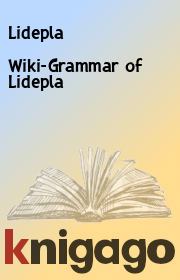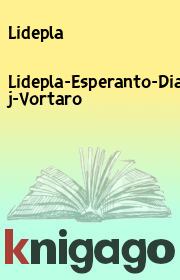Lidepla - Wiki-Grammar of Lidepla
 | Название: | Wiki-Grammar of Lidepla |
Автор: | Lidepla | |
Жанр: | Старинная литература | |
Изадано в серии: | неизвестно | |
Издательство: | неизвестно | |
Год издания: | - | |
ISBN: | неизвестно | |
Отзывы: | Комментировать | |
Рейтинг: | ||
Поделись книгой с друзьями! Помощь сайту: донат на оплату сервера | ||
Краткое содержание книги "Wiki-Grammar of Lidepla"
Аннотация к этой книге отсутствует.
Читаем онлайн "Wiki-Grammar of Lidepla". [Страница - 2]
- 1
- 2
- 3
- 4
- . . .
- последняя (10) »
b) den (before the object):
- Lubi (to love) da me (I). – I love.
- Den yu (you) me (I) lubi (to love). – I love you. It's you whom I love.
2. Word order in a phrase: adjective is before a noun (usually).
- Es (is/are) may (my) syao (little) son (son). – That's my little son.
To emphasize the adjective, it can be placed after the noun.
- Me (I) pri (to like) elay (her) gran (big) okos (eyes) blu (blue). – I like her big blue eyes.
3. Predicative adjectives and nominals
- May (my) mata (mother) es (is) talimer (teacher). – My mother is a teacher.
- May (my) sista (sister) yao (to want) bikam (to become) leker (doctor). – My sister wants to become a doctor.
- Sey (this) gela (girl) es (is) muy (very) jamile (beautiful). – This girl is very beautiful.
- Es (is) jamile (beautiful) hir (here). – It's beautiful here.
4. Impersonal sentence (without the subject)
- Pluvi (to rain) gro (much). – It rains / is raining much.
- Treba (it's necessary) shwo (to talk). – It's necessary to talk.
- Es (is) garme (hot). – It's hot.
5. Negation: negation particle bu is placed before the verb group.
- Lu (he) bu (not) somni (to sleep). – He doesn't sleep / isn't sleeping.
- Me (I) bu (not) wud (would) yao (to want) resti (to remain) dar (there). – I won't stay there.
If there is at least one negative word in the phrase, the whole phrase gets a negative meaning. If there are several of them, that only emphasizes the negative meaning.
- Lu (he) bu (not) samaji (to understand) nixa (nothing), neva (never)! – He doesn't understand anything, ever!
6. General question: the particle ob (is placed before the phrase):
- Ob yu (you) lubi (to love) me (I)? – Do you love me?
Possible answers: ya (yes), non (no), doh
a) Ob yu lubi me? – Ya, me lubi. Non, me bu lubi. – Do you love me? – Yes, I do. No, I don't.
b) Ob yu bu lubi me? – Ya / non, me bu lubi. Doh, me lubi. – Don't you love me? – No, I don't. Yes, I do.
Other ways to make a general question:
a) "bu ver?" (is placed after a phrase, with a comma):
- Es (is) hao (good) meteo (weather), bu (not) ver (really)? – The weather is good, isn't it?
Possible answers: ver (yes, it's true), bu es ver (no, it isn't true).
b) Repeating of the verb with "bu" particle:
- Yu lai-bu-lai? – Are you coming (or not)?
7. Special question
In a special question the question word is put in the beginning of the phrase, the word order doesn't change. The inversion can occur only in the phrase with the verb "bi / es/ bin": Wo (where) es (is) may (my) kalam (pencil)? – Where is my pencil?
hu – who: Hu (who) somni (to sleep)? – Who sleeps?
kwo – what: Kwo (what) yu (you) vidi (to see)? – What do you see?
kwel – what sort of, which: Kwel (what) flor (flower) yu (you) pri (to like)? – What flower do you like?
komo – how: Komo (how) yu (you) zwo (to make) se (this)? – How do you make this / have you made this?
way – why: Way (why) yu (you) bu (not) somni (to sleep)? – Why don't you sleep?
wen – when: Wen (when) yu (you) lai (to come)? – When are you coming?
wo – where: Wo (where) es (is) may (my) docha (daughter)? – Where is my daughter?
a wo – where, to what direction: A wo (where) yu (you) yao (to want) go (to go)? – Where do you want to go?
fon wo – where from: Fon wo (where from) yu (you) lai (to come)? – Where do you come from?
kwanto – how many, how much: Kwanto (how many) bonbon (sweets) yu (you) he ("past tense") chi (to eat)? – How many sweets have you eaten?
8. Emphasizing of the whole phrase meaning: ya (before or after the predicate)
- Me (I) ya lubi (to love) yu (you)! – I love you indeed!
- Es (is) ya hao (good) dey (day)! – What a good day!
9. Emphasizing of a single word: hi (in assertion), ku (in a question)
- Me (I) hi bu (not) yao (to want) somni (to sleep). – Personally I don't want to sleep.
- Yu (you) ku bu (not) yao (to want) somni (to sleep)? – Is it you who doesn't want to sleep?
Compound Sentence
1. The sentence topic: one can specialize the topic of the sentence at the beginning.
- Sey (this) aksham (evening), ob ("if") yu (you) ve ("will") go (to go) a ("to") koylok (somewhere)? – Are you going somewhere tonight?
2. Simple sentences may be combined into complex ones by conjunctions or combination "preposition + ke":
- Me (I) pri (to like) gani (to sing) e (and) yu (you) pri (to like) rasmi (to draw). – I like to sing and you like to draw.
- Me (I) wud ("would") yao (to want) lekti (to read) bat (but) kitaba (book) yok (there is no). – I would like to read but there is no book.
- Me (I) promeni (to go walking) obwol (although) pluvi (to rain). – I'm walking although it's raining.
- Me (I) mog (can) go (go) adar (there), bat (but) sol (only) kun (with) ke ("that") yu (you) go (to go) toshi (too). – I can go there, but only if you also go.
3. One simple sentence may be a constituent of another sentence. It may take place of:
3.1. the object
a) with the conjunction ke:
- Me (I) vidi (to see) ke ("that") ela (she) rasmi (to draw). – I can see that she is drawing.
b) with preposition + the particle ke:
- Me (I) shwo (talk) om (about) ke ("that") yu (you) bu (not) gun (to work). – I talk about the fact that you don't work.
c) with the particle ob:
- Me (I) bu (not) jan (to know) ob ("if") ta (he / she) es (is) in (in) dom (house). – I don't know if he / she is at home.
d) with a question word:
- Me (I) jan (to know) kwo (what) yu (you) yao (to want). – I know what you want.
e) After perception verbs (vidi (to see), kan (to look), audi (to hear), slu (to listen) etc.) there are can be "noun + participle" combination:
- Me (I) vidi (to see) ela (her) rasmi-she (drawing). – I see her draw.
3.2. attribute
a) If the attribute phrase is before the noun, use ti .. na to mark it:
- { Ti yu (you) vidi (to see) na boy (boy) } janmog (can) gani (to sing) hao (well). – The boy that you see can sing well.
b) If the attribute phrase is after the noun, it is introduced by the particle ke:
- { Boy (boy) ke ("that") yu (you) vidi (to see) } janmog (to know how) gani (to sing) gro-hao (greatly).
--">- 1
- 2
- 3
- 4
- . . .
- последняя (10) »
Книги схожие с «Wiki-Grammar of Lidepla» по жанру, серии, автору или названию:
 |
| Lidepla - Alisa in Divalanda ( Lidepla) Жанр: Языкознание Год издания: 2019 |
Другие книги автора « Lidepla»:
 |
| Lidepla - Лидепла-русский словарь Жанр: Языкознание Год издания: 2019 |
 |
| Lidepla - Лидепла для начинающих Жанр: Языкознание Год издания: 2019 |
 |
| Lidepla - Alisa in Divalanda ( Lidepla) Жанр: Языкознание Год издания: 2019 |




